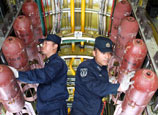
CAIRO, July 24 (Xinhua) -- Egypt started a national reconciliation dialogue on Wednesday, but the first session did not turn out to be as encouraging as expected due to the boycott by Islamist parties.
"It's one-sided dialogue," said Ahmed Sobei, spokesman of former ruling Freedom and Justice Party, the political wing of the Muslim Brotherhood from which ousted President Mohamed Morsi hails.
Sobei said his party refuses to engage in any reconciliation dialogues as they were presided over by "illegitimate" power, referring to the interim government backed by the military who deposed Morsi early this month in response to millions of protesters' demand.
"What kind of reconciliation they are talking about while the nation is under threats of a civil war?" Sobei said of an earlier call by Egyptian army chief Abdel-Fattah el-Sisi for mass Friday protests to confront terrorism.
"This dialogue of reconciliation was nipped in the bud as even partners of the coup didn't show up," said Sobei, alluding to the Islamist parties that supported the army's removal of Morsi.
On Wednesday, the Salafist Nour Party, which supported the army's move on July 3, set its own conditions for joining the national reconciliation dialogue. The list of conditions includes introducing a code of media ethics, reopening the religious channels that were closed by the government in the wake of the ouster of Morsi and safeguarding the current constitution from being scraped.
In the meantime, the Strong Egypt Party, an moderate Islamic party, also declined the invitation to the session "as it ignored important political parties and powers," a statement from the party said on Wednesday.
Neither the military nor judiciary took part in the national reconciliation dialogue. "The two national institutions are not in enmity with any forces, so they are not participating in the dialogue," said presidential spokesman Ahmed el-Mislimani.
The first session was led by Interim President Adly Mansour and attended by Vice President for Foreign Relations Mohamed El-Baradei.
Participants, including representatives from a number of liberal parties and some public figures, agreed to work for developing a concept for national transitional justice, take necessary decisions and introduce mechanisms that will help to achieve national reconciliation.
"The size of participants in the first reconciliation session can tell us that reaching reconciliation has become a very difficult mission," said Yousry Azbawy, a senior researcher at Al-Ahram Center for Political and Strategic Studies.
Azbawy sees that neither side (Islamists or liberals) is listening to each other.
"Brotherhood has opted to the choice of confrontation and today el-Sisi declared that he is ready for confrontation too," Azbawy told Xinhua.
Azbawy said that without the Brotherhood on the table, no reconciliation can be achieved. He added that the refusal of other Islamist parties to take part in the session even made the matter worse for those reconciliation efforts.
"Now everyone wants reconciliation on his own terms and this will end in nowhere," he concluded.
From his perspective, Emad Awad, a professor of Political Science at Cairo University, said that no reconciliation dialogue will succeed under such circumstances.
"We first have to end the state of violence and distrust in the Egyptian streets and we also have to punish those who incited violence," Awad told Xinhua.
He said that the current dialogue is similar to those dialogues that the former president used to call for and where only one side participate.
"I think that the government only called for this first session to tell the world that it sticks to the declared transitional roadmap," he said.
"Only when the violence has ended, parties that have real desire to serve the country's interests can sit together and reach reconciliation," Awad said.
He noted that young members of Muslim Brotherhood who denounce violence are the hope for reaching reconciliation as current leaders of the group are only looking for a safe exit for themselves.
















 Dog survives after 30 hours buried in debris
Dog survives after 30 hours buried in debris


![]()
